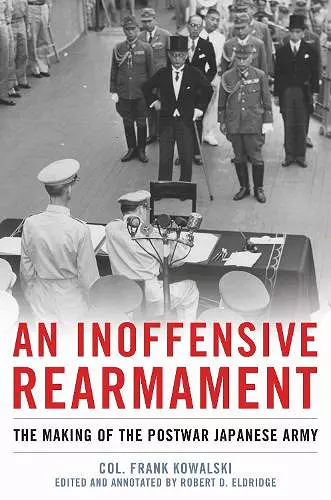An Inoffensive Rearmament
The Making of the Postwar Japanese Army
Estate of Frank Kowalski author Arthur D Baker editor
Format:Hardback
Publisher:Naval Institute Press
Published:30th Jan '14
Currently unavailable, our supplier has not provided us a restock date

Colonel Frank Kowalski served as the Chief of Staff of the American military advisory group that helped establish the National Police Reserve, the predecessor to the Japan Self-Defense Forces, and provided daily guidance to it during its first two years of existence.
In this book, Kowalski provides, with great care, a detailed account of the manning, logistics, and personalities involved in standing up, on short notice, of a force of approximately 75,000, while sharing insights about the diplomatic, political, legal, and constitutional challenges his headquarters and his Japanese counterparts faced in navigating this new course for Japan in the wake of the sudden outbreak of war on the Korean Peninsula in June 1950. In light of these limitations, the path for rearmament had to be slow and “inoffensive” while psychologically and materially contributing to Japan’s defense. His account is balanced, a blend of both criticism and praise, of all of those involved, including himself. Kowalski, who later served in Congress, was a highly intelligent Army officer who was expecting to be deployed to Korea in the summer of 1950, after serving in local military governments in western Japan, when he was tapped for the above secret mission to make a new Japanese army while having to call it a police reserve. An honourable man, he was pained by the subterfuge he and his government, working hand in hand with the Japanese government, had to play in order to establish this needed organisation and believes many things were mishandled, but also viewed the “quiet and reasonable approach” of the rearmament programme as successful and allowing the NPR to “adequately and effectively” provide for the urgent defense needs of the Japan and the United States, with its quarter million dependents left to fend for themselves in Japan in 1950. Kowalski notes that there has always been a tension in the postwar U.S.-Japan relationship over Japan not doing enough to contribute to the bilateral alliance and international security.
This book will not end that debate, but it provides greater context and historical understanding of what factors existed at the time. This is a particularly important topic as Japan is re-examining its defense posture today, both for its own needs as well as to strengthen...
"A reader that experienced the occupations of Iraq and Afghanistan will appreciate An Inoffensive Rearmament. Written by a key leader charged to develop the National Police Reserve (later the Self-Defense Forces) in post-World War II Japan, the work provides remarkable insights into how the United States handled a partner nation that was once an enemy. Translated from the original Japanese, the work balances the political scene and mercurial relationship between post-World war II Japan and pre-Korean War United States."--Military Review "This book gives a close and detailed look at Japan, as she sought to return to being a political and economic power on the world stage. In concluding his story, the author asks the question, 'Where would Japan sit today upon the world stage if the Korean War had not been fought?' The book provides an excellent case study of unforeseen and unwanted consequences resulting from a political-military action. In this case, an action that sought to conquer South Korea failed and resulted in the promotion of both South Korea and Japan as world economic powers. This is a book well worth reading by anyone interested in American foreign policy, modern Japanese history, or the U.S. Army's role in nation building."--Journal of America's Military Past
ISBN: 9781591142263
Dimensions: unknown
Weight: 172g
224 pages